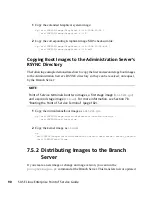
Description
Type
Option
tion, size can be specified as
x
which re-
sults in all remaining available space to be
used.
When deploying to the harddisk of a specific machine, use:
posAdmin.pl --user
cn=admin,o=
mycorp
,c=
us
--password
secret
--base
cn=
cshr4152
,cn=global,o=
mycorp
,c=
us
--add --scHarddisk --cn
sda
--scDevice
/dev/sda
--scHdSize
9000
--scPartitionsTable
"
1000 82 x
;
8000 83 /
"
When deploying to the harddisk of a generic machine (using example from Section 7.4.1,
“Adding an
scCashRegister
Object” (page 74)), enter:
posAdmin.pl --user
cn=admin,o=
mycorp
,c=
us
--password
secret
--base
cn=
cr-test-default
,cn=global,o=
mycorp
,c=
us
--add
--scHarddisk --cn
sda
--scDevice
/dev/sda
--scHdSize
9000
--scPartitionsTable "
1000 82 x
;
8000 83 /
"
7.4.4 Adding an
scConfigFileTemplate
Object
scConfigFileTemplate
objects are used when you run services, such as the X
Window service, that require hardware-dependent configuration files. An
scConfigFileTemplate
object contains the configuration file data that a Point
of Service terminal needs in order to run a given service.
To define the
scConfigFileTemplate
object with the
posAdmin
script, you
designate the file containing the configuration data as the
--scConfigFileData
parameter.
posAdmin
then extracts the configuration data from the source file and
stores the content under
scConfigFileData
entry of the
scConfigFileTemplate
object.
When a Point of Service terminal registers with a Branch Server (or when you run
posAdmin.pl --updateconfig or posldap2crconfig.pl --dumpall
),
the Branch Server retrieves the configuration data in the
scConfigFileTemplate
78
SUSE Linux Enterprise Point of Service Guide
















































